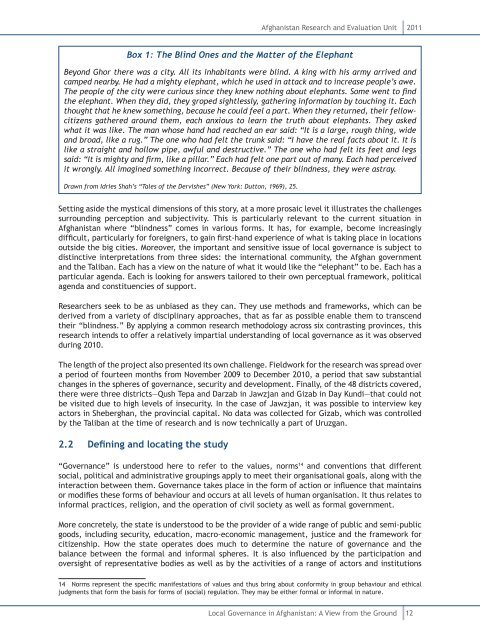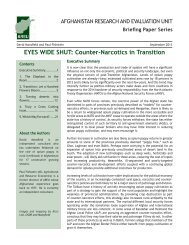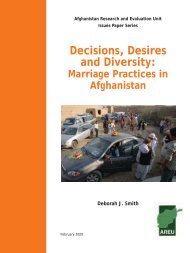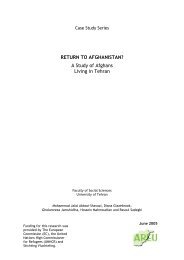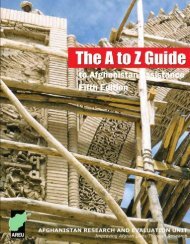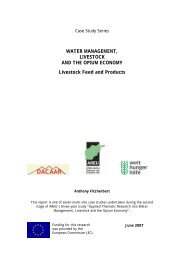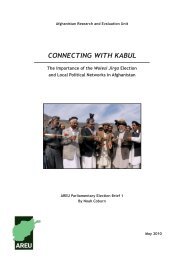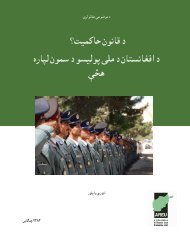Local Governance in Afghanistan: A View from the Ground
Local Governance in Afghanistan: A View from the Ground
Local Governance in Afghanistan: A View from the Ground
- No tags were found...
Create successful ePaper yourself
Turn your PDF publications into a flip-book with our unique Google optimized e-Paper software.
<strong>Afghanistan</strong> Research and Evaluation Unit<br />
2011<br />
Box 1: The Bl<strong>in</strong>d Ones and <strong>the</strong> Matter of <strong>the</strong> Elephant<br />
Beyond Ghor <strong>the</strong>re was a city. All its <strong>in</strong>habitants were bl<strong>in</strong>d. A k<strong>in</strong>g with his army arrived and<br />
camped nearby. He had a mighty elephant, which he used <strong>in</strong> attack and to <strong>in</strong>crease people’s awe.<br />
The people of <strong>the</strong> city were curious s<strong>in</strong>ce <strong>the</strong>y knew noth<strong>in</strong>g about elephants. Some went to f<strong>in</strong>d<br />
<strong>the</strong> elephant. When <strong>the</strong>y did, <strong>the</strong>y groped sightlessly, ga<strong>the</strong>r<strong>in</strong>g <strong>in</strong>formation by touch<strong>in</strong>g it. Each<br />
thought that he knew someth<strong>in</strong>g, because he could feel a part. When <strong>the</strong>y returned, <strong>the</strong>ir fellowcitizens<br />
ga<strong>the</strong>red around <strong>the</strong>m, each anxious to learn <strong>the</strong> truth about elephants. They asked<br />
what it was like. The man whose hand had reached an ear said: “It is a large, rough th<strong>in</strong>g, wide<br />
and broad, like a rug.” The one who had felt <strong>the</strong> trunk said: “I have <strong>the</strong> real facts about it. It is<br />
like a straight and hollow pipe, awful and destructive.” The one who had felt its feet and legs<br />
said: “It is mighty and firm, like a pillar.” Each had felt one part out of many. Each had perceived<br />
it wrongly. All imag<strong>in</strong>ed someth<strong>in</strong>g <strong>in</strong>correct. Because of <strong>the</strong>ir bl<strong>in</strong>dness, <strong>the</strong>y were astray.<br />
Drawn <strong>from</strong> Idries Shah’s “Tales of <strong>the</strong> Dervishes” (New York: Dutton, 1969), 25.<br />
Sett<strong>in</strong>g aside <strong>the</strong> mystical dimensions of this story, at a more prosaic level it illustrates <strong>the</strong> challenges<br />
surround<strong>in</strong>g perception and subjectivity. This is particularly relevant to <strong>the</strong> current situation <strong>in</strong><br />
<strong>Afghanistan</strong> where “bl<strong>in</strong>dness” comes <strong>in</strong> various forms. It has, for example, become <strong>in</strong>creas<strong>in</strong>gly<br />
difficult, particularly for foreigners, to ga<strong>in</strong> first-hand experience of what is tak<strong>in</strong>g place <strong>in</strong> locations<br />
outside <strong>the</strong> big cities. Moreover, <strong>the</strong> important and sensitive issue of local governance is subject to<br />
dist<strong>in</strong>ctive <strong>in</strong>terpretations <strong>from</strong> three sides: <strong>the</strong> <strong>in</strong>ternational community, <strong>the</strong> Afghan government<br />
and <strong>the</strong> Taliban. Each has a view on <strong>the</strong> nature of what it would like <strong>the</strong> “elephant” to be. Each has a<br />
particular agenda. Each is look<strong>in</strong>g for answers tailored to <strong>the</strong>ir own perceptual framework, political<br />
agenda and constituencies of support.<br />
Researchers seek to be as unbiased as <strong>the</strong>y can. They use methods and frameworks, which can be<br />
derived <strong>from</strong> a variety of discipl<strong>in</strong>ary approaches, that as far as possible enable <strong>the</strong>m to transcend<br />
<strong>the</strong>ir “bl<strong>in</strong>dness.” By apply<strong>in</strong>g a common research methodology across six contrast<strong>in</strong>g prov<strong>in</strong>ces, this<br />
research <strong>in</strong>tends to offer a relatively impartial understand<strong>in</strong>g of local governance as it was observed<br />
dur<strong>in</strong>g 2010.<br />
The length of <strong>the</strong> project also presented its own challenge. Fieldwork for <strong>the</strong> research was spread over<br />
a period of fourteen months <strong>from</strong> November 2009 to December 2010, a period that saw substantial<br />
changes <strong>in</strong> <strong>the</strong> spheres of governance, security and development. F<strong>in</strong>ally, of <strong>the</strong> 48 districts covered,<br />
<strong>the</strong>re were three districts—Qush Tepa and Darzab <strong>in</strong> Jawzjan and Gizab <strong>in</strong> Day Kundi—that could not<br />
be visited due to high levels of <strong>in</strong>security. In <strong>the</strong> case of Jawzjan, it was possible to <strong>in</strong>terview key<br />
actors <strong>in</strong> Sheberghan, <strong>the</strong> prov<strong>in</strong>cial capital. No data was collected for Gizab, which was controlled<br />
by <strong>the</strong> Taliban at <strong>the</strong> time of research and is now technically a part of Uruzgan.<br />
2.2 Def<strong>in</strong><strong>in</strong>g and locat<strong>in</strong>g <strong>the</strong> study<br />
“<strong>Governance</strong>” is understood here to refer to <strong>the</strong> values, norms 14 and conventions that different<br />
social, political and adm<strong>in</strong>istrative group<strong>in</strong>gs apply to meet <strong>the</strong>ir organisational goals, along with <strong>the</strong><br />
<strong>in</strong>teraction between <strong>the</strong>m. <strong>Governance</strong> takes place <strong>in</strong> <strong>the</strong> form of action or <strong>in</strong>fluence that ma<strong>in</strong>ta<strong>in</strong>s<br />
or modifies <strong>the</strong>se forms of behaviour and occurs at all levels of human organisation. It thus relates to<br />
<strong>in</strong>formal practices, religion, and <strong>the</strong> operation of civil society as well as formal government.<br />
More concretely, <strong>the</strong> state is understood to be <strong>the</strong> provider of a wide range of public and semi-public<br />
goods, <strong>in</strong>clud<strong>in</strong>g security, education, macro-economic management, justice and <strong>the</strong> framework for<br />
citizenship. How <strong>the</strong> state operates does much to determ<strong>in</strong>e <strong>the</strong> nature of governance and <strong>the</strong><br />
balance between <strong>the</strong> formal and <strong>in</strong>formal spheres. It is also <strong>in</strong>fluenced by <strong>the</strong> participation and<br />
oversight of representative bodies as well as by <strong>the</strong> activities of a range of actors and <strong>in</strong>stitutions<br />
14 Norms represent <strong>the</strong> specific manifestations of values and thus br<strong>in</strong>g about conformity <strong>in</strong> group behaviour and ethical<br />
judgments that form <strong>the</strong> basis for forms of (social) regulation. They may be ei<strong>the</strong>r formal or <strong>in</strong>formal <strong>in</strong> nature.<br />
<strong>Local</strong> <strong>Governance</strong> <strong>in</strong> <strong>Afghanistan</strong>: A <strong>View</strong> <strong>from</strong> <strong>the</strong> <strong>Ground</strong><br />
12


